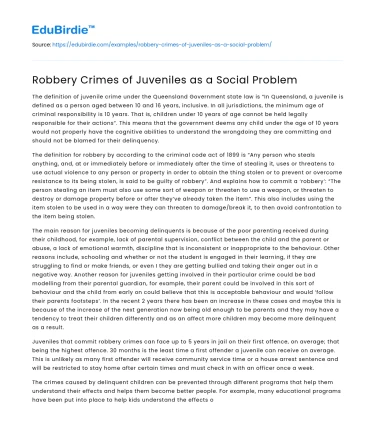The definition of juvenile crime under the Queensland Government state law is “In Queensland, a juvenile is defined as a person aged between 10 and 16 years, inclusive. In all jurisdictions, the minimum age of criminal responsibility is 10 years. That is, children under 10 years of age cannot be held legally responsible for their actions”. This means that the government deems any child under the age of 10 years would not properly have the cognitive abilities to understand the wrongdoing they are committing and should not be blamed for their delinquency.
The definition for robbery by according to the criminal code act of 1899 is “Any person who steals anything, and, at or immediately before or immediately after the time of stealing it, uses or threatens to use actual violence to any person or property in order to obtain the thing stolen or to prevent or overcome resistance to its being stolen, is said to be guilty of robbery”. And explains how to commit a ‘robbery’: “The person stealing an item must also use some sort of weapon or threaten to use a weapon, or threaten to destroy or damage property before or after they’ve already taken the item”. This also includes using the item stolen to be used in a way were they can threaten to damage/break it, to then avoid confrontation to the item being stolen.
Save your time!
We can take care of your essay
- Proper editing and formatting
- Free revision, title page, and bibliography
- Flexible prices and money-back guarantee
The main reason for juveniles becoming delinquents is because of the poor parenting received during their childhood, for example, lack of parental supervision, conflict between the child and the parent or abuse, a lack of emotional warmth, discipline that is inconsistent or inappropriate to the behaviour. Other reasons include, schooling and whether or not the student is engaged in their learning, if they are struggling to find or make friends, or even I they are getting bullied and taking their anger out in a negative way. Another reason for juveniles getting involved in their particular crime could be bad modelling from their parental guardian, for example, their parent could be involved in this sort of behaviour and the child from early on could believe that this is acceptable behaviour and would ‘follow their parents footsteps’. In the recent 2 years there has been an increase in these cases and maybe this is because of the increase of the next generation now being old enough to be parents and they may have a tendency to treat their children differently and as an affect more children may become more delinquent as a result.
Juveniles that commit robbery crimes can face up to 5 years in jail on their first offence, on average; that being the highest offence. 30 months is the least time a first offender a juvenile can receive on average. This is unlikely as many first offender will receive community service time or a house arrest sentence and will be restricted to stay home after certain times and must check in with an officer once a week.
The crimes caused by delinquent children can be prevented through different programs that help them understand their effects and helps them become better people. For example, many educational programs have been put into place to help kids understand the effects of drugs, sex, gangs and weapons. This helps kids have awareness that their actions have consequences. Many groups in the community helps with the youth involvement; church groups, girl/boy scouts and volunteer groups help involve the youths in a safe environment.
Over the years the amount of robbery crimes that have been committed by juveniles have been decreasing year by year since 2010 with a recent spike in the amount of cases in 2017 – 2019 and having a total increase of 83 over the past 3 years. There is many measures put into place to discourage this delinquency, such as communitive groups or more serious measures for example, community service, house arrest or jail time. But the main reasons found for juveniles to commit these crimes if more of the environment they had been brought up in, instead of who they are, as opposed to this, there will always be reasons for this behaviour that may be out of control and cannot be influenced without serious mental support. But in conclusion many consequences are put in place and there are many way communities are supporting their youth to help stop this behaviour form stopping and until very recently the number of cases has decreased every year.






 Stuck on your essay?
Stuck on your essay?

